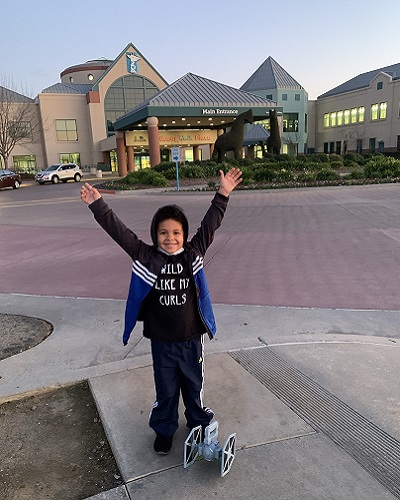A Comeback from Rare Complications
“Let’s throw a football,” six-year-old Bryce shouted as he ran around Bulldog Stadium, his little sister, Peyton, right behind him. “I cannot keep up with this kid,” his mom, Jennifer Moore, said, shaking her head while her husband went to look for a ball.
In January of 2021, Jennifer didn’t know what would happen to her son. Two months after she and her husband tested positive for COVID-19, Bryce – who tested negative and never showed any symptoms of the virus – began to feel sick. It started with a headache and within days, he developed a high fever and rash on his back, lost his appetite and had a very stiff neck. An on-call pediatrician first suspected meningitis, so his parents rushed him to Valley Children’s Emergency Department (ED), where the team stabilized his symptoms and allowed him to go home. Bryce returned days later, his health deteriorating. That’s when the ED team learned Bryce had recently been exposed to COVID-19, and they knew exactly what was wrong. He had multisystem inflammatory syndrome in children, or MIS-C, a rare, but serious, condition associated with COVID-19 that causes different body parts to become inflamed, including the heart, lungs, kidneys, brain and skin.

Bryce outside of Valley Children's Hospital
“MIS-C is like a tornado or cascade of events that happens when a child’s immune system goes into overdrive,” explained Valley Children’s Pediatric Rheumatologist Dr. Reshma Patel, who spent much of 2021 educating pediatricians on how to diagnosis and treat MIS-C. “At one point in the pandemic, our hospital detected one out of every four cases of MIS-C in the entire state. It is not contagious and can occur 2-8 weeks after a symptomatic or asymptomatic COVID-19 infection. While some cases of MIS-C are mild, this complication can be quite serious, even deadly, if not treated in time. Fortunately, Valley Children’s Hospital has the specialists and the treatments needed to help children who develop MIS-C.”
Bryce spent four days at Valley Children’s, including one day in the Pediatric Intensive Care Unit (PICU). Because the long-term effects of MIS-C aren’t yet known, Bryce will continue to receive follow-up care from Valley Children’s pediatric rheumatology and pediatric cardiology teams. So far, each checkup has shown no lingering problems and no signs of Bryce slowing down, which is just fine with mom.

Bryce enjoying a day at Fresno State's football stadium
“He got to start kindergarten in the fall and in person, too,” Jennifer said. “To see him with his classmates, playing sports again and smiling…that means everything to me.”